On March 16, human rights activist Gautam Navlakha penned a letter, piecing together words of lament and surrendering to imminent arrest. Mr. Navlakha, is among the 16 human rights defenders who were arrested without trial in 2018 under the Unlawful Activities (Prevention) Act, 1967, for their alleged role in instigating caste violence at Bhima Koregaon. In a letter published in The Caravan, he wrote he was “joining the ranks of thousands of others who are made to suffer for their convictions,” and dared to “hope to be freed” from “another conspiracy trial.”
Mr. Navlakha walked free after four years of incarceration on May 14. The Supreme Court granted bail to the 70-year-old, noting that charges are yet to be framed, and the trial would take “years and years and years for its completion.”
Six of Mr. Navlakha’s co-accused have been released on bail in the last six years: Sudha Bharadwaj, Anand Teltumbde, Vernon Gonsalves, Arun Ferreira, Varavara Rao and Shoma Sen. Activist Mahesh Raut secured bail in September last year but continues to remain in jail. Still behind bars are activists Rona Wilson and Sudhir Dhawale; lawyer Surendra Gadling; associate professor Hany Babu; activists and artists Sagar Gorkhe, Ramesh Gaichor and Jyoti Jagtap. Father Stan Swamy passed away while in detention in Mumbai’s Taloja Jail in July 2021, after being denied bail under medical grounds several times.
The Hindu traces the legal developments, taking you through the deferrals and detentions that have come to define the fate of the 16 incarcerated.
Gautam Navlakha
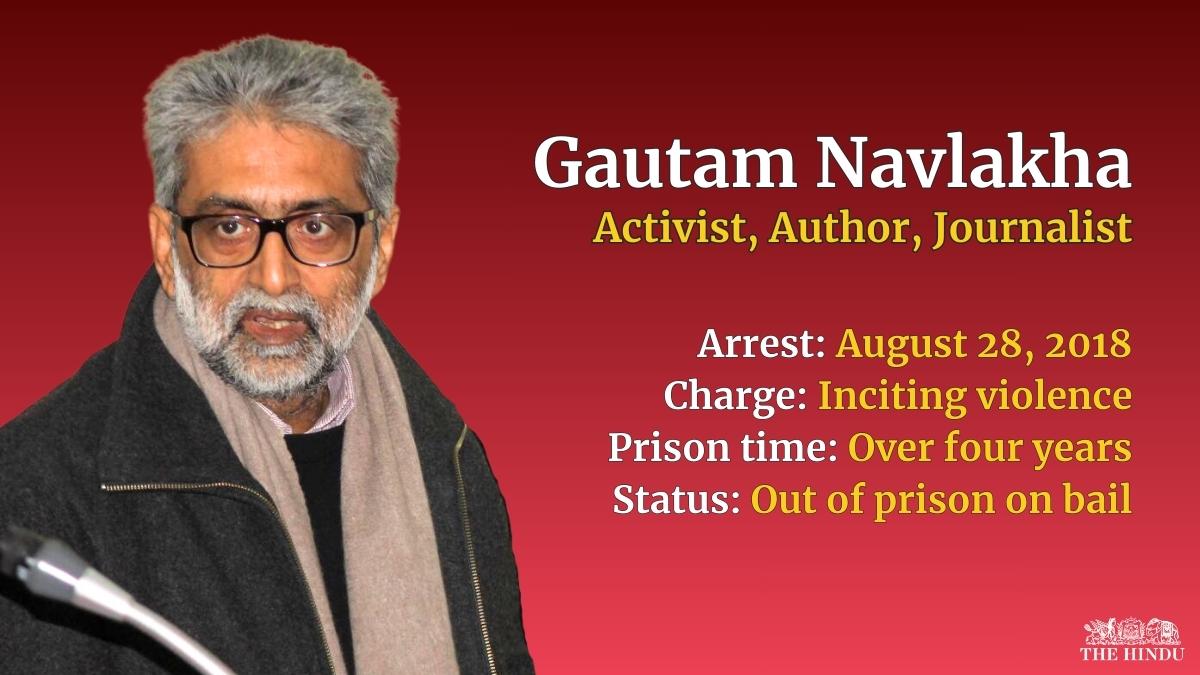
The Delhi-based activist-author was involved with the People’s Union for Democratic Rights. He has worked with the Economic and Political Weekly and NewsClick, emerging as a fierce critic of repressive laws and militarism in the Kashmir valley and northeastern states. Mr. Navlakha has called his arrest a “ploy against political dissident,” orchestrated by a “cowardly government” who was “shielding the real culprits,” referring to two prominent Hindutva activists.
Mr. Navlakha was arrested on August 28, 2018, based on purported evidence of “involvement in inciting violence” during the Bhima Koregaon rally on December 31, 2017. The Pune police on the same day also arrested P. Varavara Rao, Sudha Bharadwaj, Arun Ferreira and Vernon Gonsalves. The Supreme Court directed that the accused be kept under house arrest; Justice D.Y. Chandrachud in his dissenting opinion cast doubt on “whether the Maharashtra police has…acted as fair and impartial investigating agency.” A local court granted the Maharashtra police’s appeal to transfer Mr. Navlakha to Pune, which was quashed later by the Delhi HC in October 2018. The Bombay HC in November ordered the police to refrain from taking coercive action against Mr. Navlakha. The activist, however, was subsequently imprisoned in the Taloja Jail in March 2020, after the SC refused anticipatory bail and directed him to surrender within three weeks before the National Investigation Agency (NIA).
Two years later, Mr. Navlakha was shifted from the Taloja Jail into house arrest on the grounds of ill health and poor prison facilities. Mr. Navalkha requested a mosquito net (required under his medical treatment), a plea rebuffed by the prison authorities.
The Bombay HC in December last year granted bail to Mr. Navlakha, observing there was no proof to back NIA’s claim that the activists had committed a terrorist act under the UAPA. The Court, however, stayed the implementation of the order for three weeks when NIA sought time to appeal against the bail order.
On May 14, the SC said that “there is no need to extend the interim order of stay,” and ordered Mr. Navlakha to pay ₹20 lakh towards the expenses of the house arrest so far.
Shoma Sen
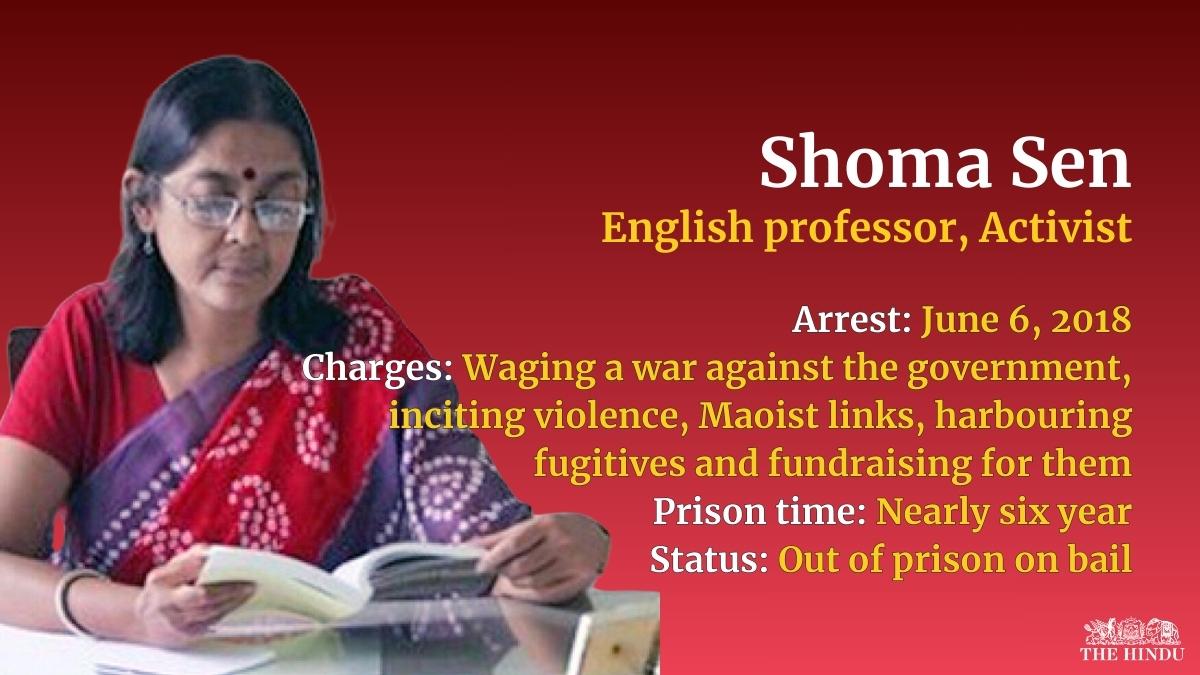
Shoma Sen is an English professor and a Dalit and women’s rights activist. A member of the Committee for the Protection of Democratic Rights since the 80s, Dr. Sen later became the founder-convenor of the Committee Against Violence on Women, which organised legal aid for women political prisoners during the 2000s. Dr. Sen has also been part of fact-finding missions investigating allegations of sexual violence against Adivasis in Chhattisgarh and atrocities by security forces in Manipur.
Last month, Nagpur University professor Shoma Sen walked out of Byculla Jail after securing bail from the SC. She was arrested on June 6, 2018, by the Pune Police, along with Surendra Gadling, Sudhir Dhawale, Rona Wilson and Mahesh Raut under various sections of the UAPA and the Indian Penal Code. Among other charges, Dr. Sen was accused of “waging a war” against the government; inciting violence in the January 2018 gathering; having Maoist links; and harbouring fugitives and fundraising for them. Dr. Sen was suspended from her position in Nagpur University on June 15.
Dr. Sen was lodged in Pune’s Yerwada Central Jail. The professor had applied for bail on October 15, 2018, on health grounds; she suffers from high blood pressure, arthritis, early onset of hyper glaucoma, among other ailments. The NIA was turned down a second bail plea on November 2, noting that the investigation revealed “material linking her involvement in alleged unlawful activities inimical to the country’s security.” The agency has not, however, provided evidence for this claim as yet.
Dr. Sen challenged the UAPA charges in the Bombay HC in April 2021. She argued that NIA’s case was based onevidence retrieved from Rona Wilson’s electronic device, which was infiltrated with malware, as confirmed in a forensic report by Arsenal Consulting. She made another bail attempt in September 2021, citing susceptibility to Covid-19 due to pre-existing conditions; this was rejected.
On April 5, the SC granted bail to Dr. Sen, finding no prima facie evidence against her and taking into account her age, ailments and six-year-long incarceration.
Sudha Bharadwaj
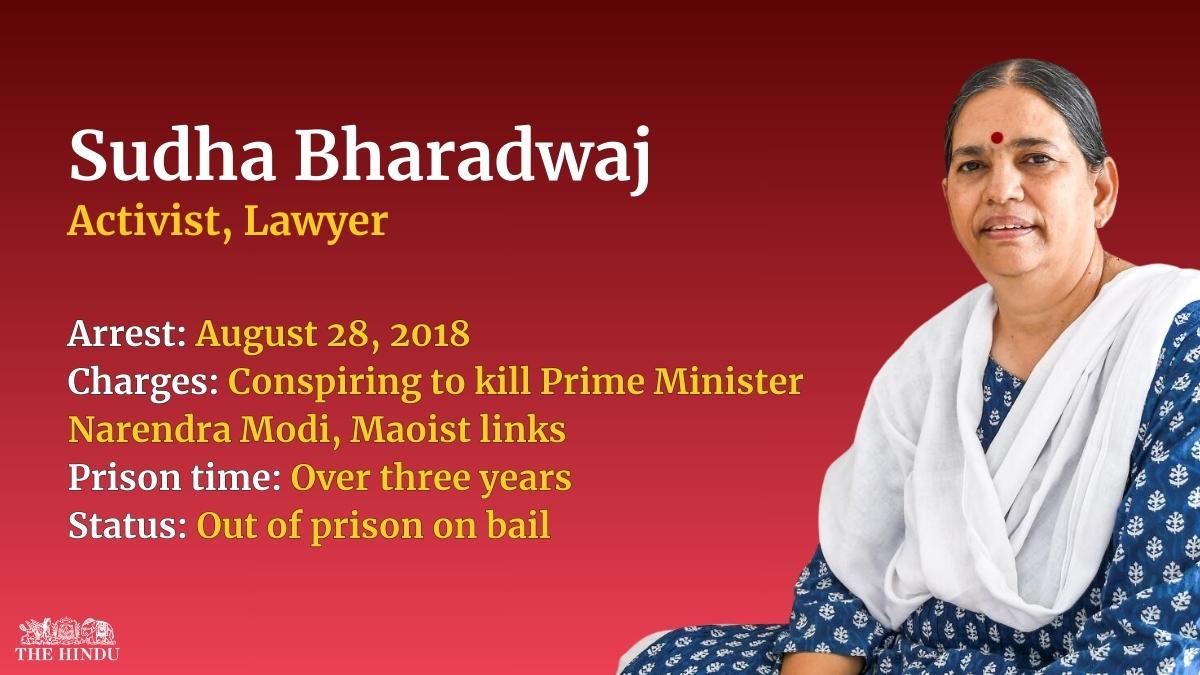
The activist-lawyer Sudha Bharadwaj has advocated for the protection of workers’ and Adivasi rights in Chhattisgarh for more than three decades. She renounced American citizenship at 23 and has since immersed herself in union work. Ms. Bharadwaj wrote about her life in prison in From Phansi Yard.
Ms. Bharadwaj was arrested under UAPA on August 28, 2018, and has spent 15 months at Pune’s Yerawada jail and another year at Mumbai’s Byculla jail.
The activist was granted default bail by the Bombay HC on December 1, 2021, under Section 167(2) of the Criminal Procedure Code and Section 43D(2) of the UAPA. The court noted that the Additional Sessions Judge who submitted the police’s chargesheet and extended her detention period was not authorised to do so. Per law, one is entitled to default bail if the investigating agency fails to file charges within a set period (90 days, in this case). The remaining accused had been denied default bail earlier.
The NIA challenged the Bombay HC’s order; the appeal was dismissed by the SC on December 7. Ms. Bharadwaj walked out on bail on December 9, 2021.
Anand Teltumbde
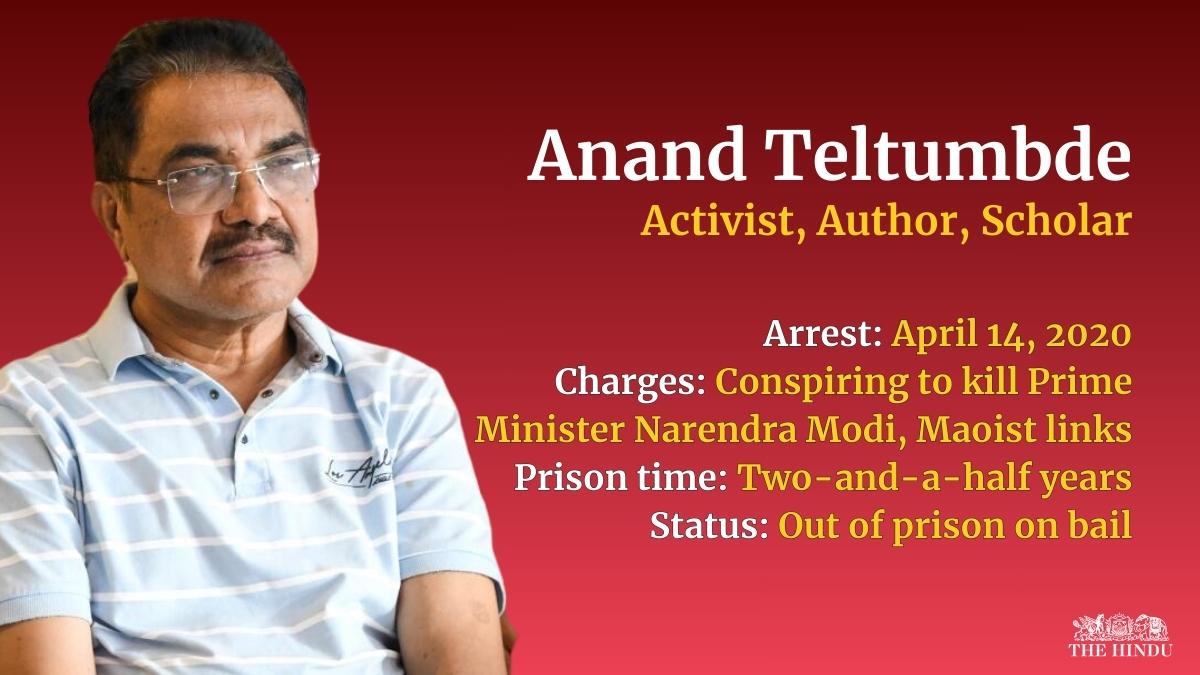
The 73-year-old has championed Dalit rights and written about India’s caste system. He previously taught at the Indian Institute of Technology, Kharagpur, and the Indian Institute of Management.
Along with Mr. Navlakha, Anand Teltumbde surrendered to the NIA in April 2020 for alleged membership of the banned Communist Party of India (Maoist) and his involvement in the Bhima Koregaon event. Mr. Teltumbde’s lawyer later argued that the activist was not present at the event, and did not make any provocative speech.
The Dalit scholar filed three bail applications between September 2021 and March 2022. The first plea was on medical grounds — chronic asthma and cervical spondylitis, among other conditions— and was rejected by an NIA special court. The Court in December 2021 denied Mr. Teltumbde’s interim bail application to be with his mother, after the death of his brother Milind Teltumbde. The Bombay HC subsequently allowed Mr. Teltumbde to visit his mother on March 6, 2022, and asked the Maharashtra government to consider his health ailments.
On March 31, Mr. Teltumbde filed a plea in the Bombay HC arguing that he was wrongly charged under the UAPA and that the NIA had not produced any charges of direct violence. He later approached the NIA’s special court, maintaining that the agency had not produced evidence of any involvement with the CPI (Maoist).
Mr. Teltumbde remained lodged in the Taloja Prison. The Bombay HC granted bail to him on November 18, 2022, noting that the NIA’s charges of terrorism, conspiracy and unlawful activity were unfounded.
Arun Ferreira
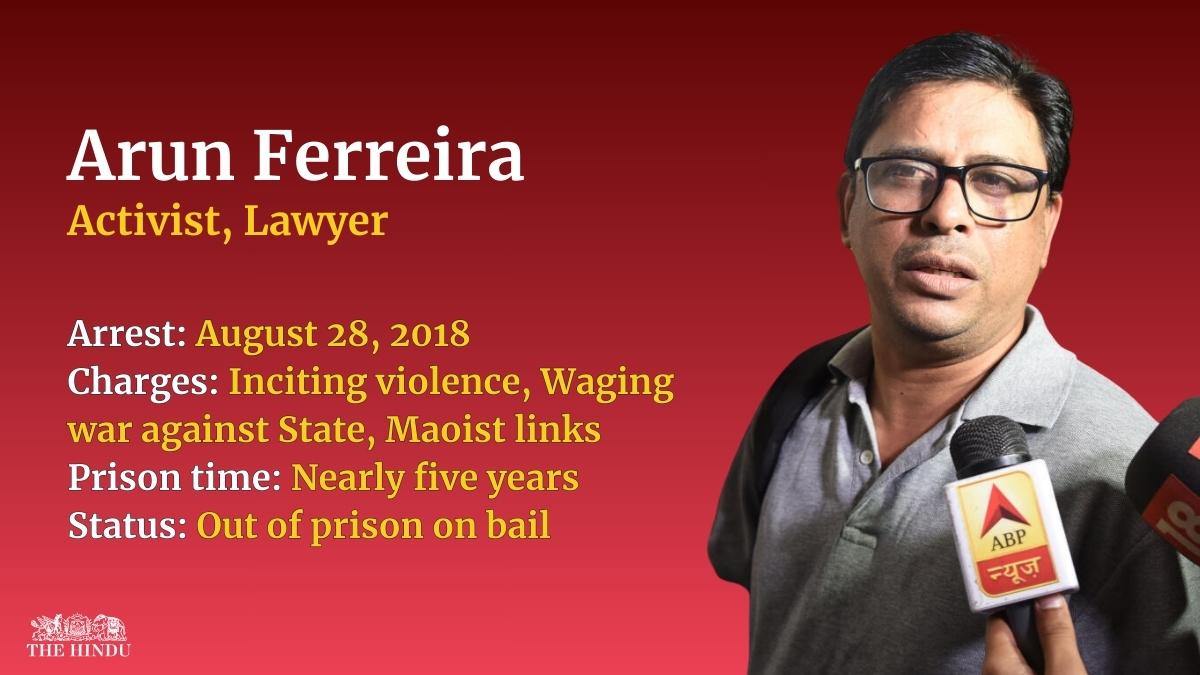
The human rights activist has been a member of the Committee for Protection of Democratic Rights. He was arrested in 2007 for alleged links to the Naxalism movement, and acquitted in 2012. Mr. Ferreira is a political cartoonist; his sketches were published in Colours of the Cage.
Arun Ferreira was arrested on August 28, 2018, in connection with the Elgar Parishad violence and for links to the banned CPI (Maoist). The Bombay HC dismissed his bail application in October 2019; his default bail application in December 2021 was also rejected, along with seven other co-accused. A petition challenging this order was dismissed on May 4, 2022.
Mr. Ferreira was lodged first in the Yerwada Central jail for more than a year, and then shifted to the Taloja Central Jail. The SC in July 2023 granted bail to Mr. Ferreira and co-accused Vernon Gonsalves, noting that “almost five years have elapsed” since their arrest and NIA’s “materials cannot justify the continued detention of the appellants pending the outcome of the case.”
Vernon Gonsalves
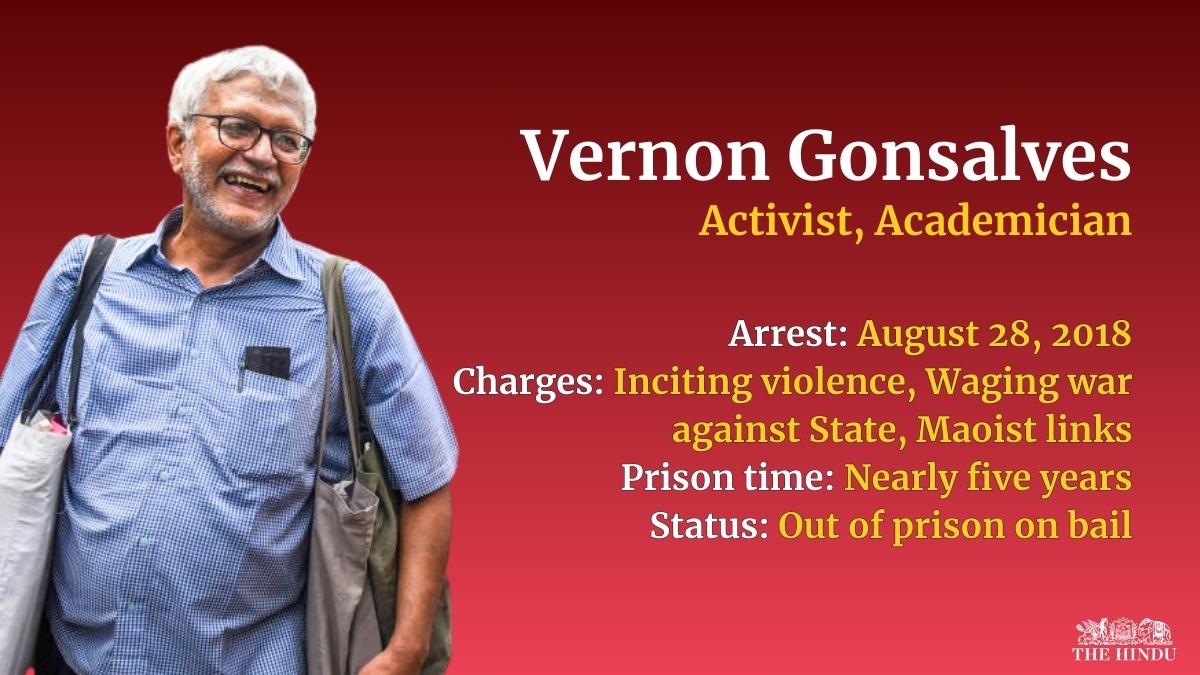
A Mumbai-based academic and writer, Mr. Gonsalves has advocated for Dalit and adivasi rights. The activist was arrested under the UAPA and Arms Act in 2007 and was convicted six years later. Mr. Gonsalves was released subsequently; he had served his sentence in pre-trial detention, a court noted.
Mr. Gonsalves was arrested on August 28, 2021, and his default bail application was rejected by the Bombay HC in December that year. Along with his co-accused, Mr. Gonsalves made a representation to the SC-appointed Technical Committee to direct the NIA to hand over his phone after reports of Pegasus malware emerged.
The activist appealed the Bombay HC’s rejection of his bail plea in the SC. A Bench of Justices Aniruddha Bose and Sudhanshu Dhulia granted bail to Mr. Gonsalves, noting that holding certain literature through which violent acts may be propagated would not attract the provisions of UAPA. The special NIA court has imposed additional conditions, directing both Mr. Gonsalves and Mr. Ferreira to furnish a personal recognizance (PR) bond of ₹50,000 each and to not speak to the media about the case.
Varavara Rao
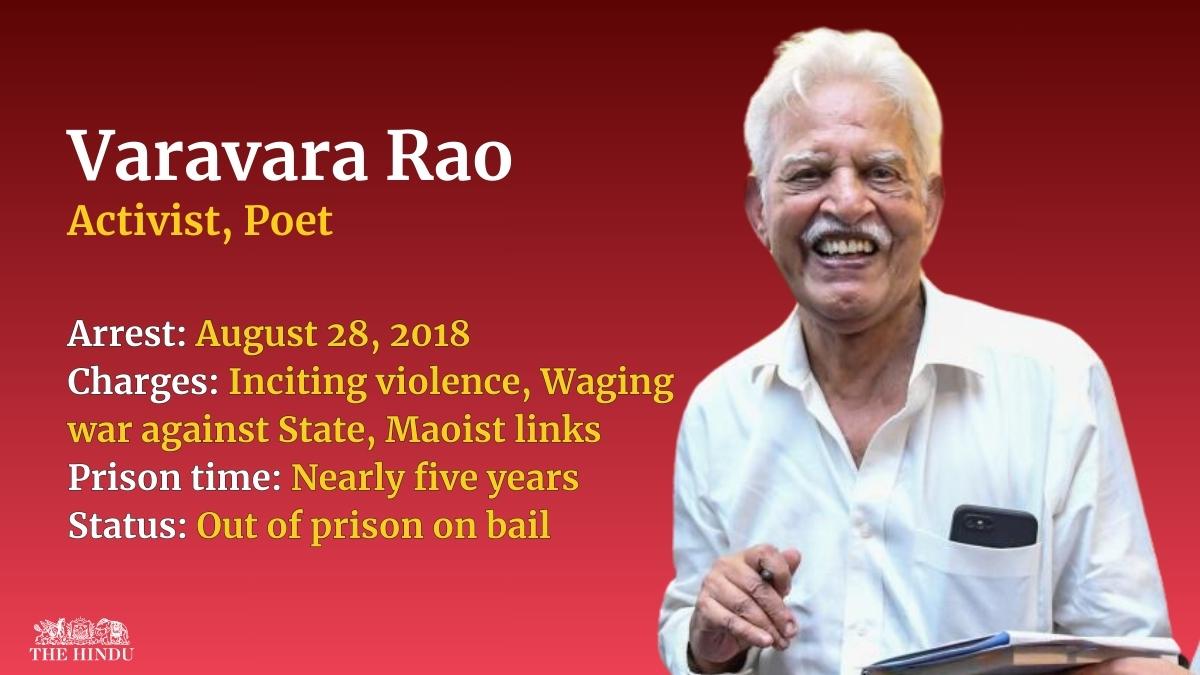
The poet, academic, teacher and civil rights activist is based in Telangana. Varavara Rao is the founder of the Revolutionary Writers’ Association; taught at private colleges; worked at the Ministry of Information and Broadcasting. Mr. Rao has been arrested at least 16 times since 1973; he spent over seven years in imprisonment; and was acquitted in 13 of the cases.
Mr. Rao was arrested on August 28, 2018, along with four co-accused. Mr. Rao received an interim bail on medical grounds on March 6, 2021; the Bombay HC noted his age, sickness and “serious” health ailments called for quality medical aid, and said that sending him back to Taloja Central Prison would violate his fundamental rights. Mr. Rao subsequently petitioned for permanent medical bail — a request denied by the Court, which directed the NIA to conduct an expeditious trial and review the condition of all prisons in Maharashtra. In December 2021, Mr. Rao’s default bail application was rejected by the Bombay HC.

During his imprisonment, Mr. Rao tested positive for COVID-19; he was also admitted to a government hospital and found lying injured there. The 82-year-old has also shown signs of Parkinson’s disease. The NIA has opposed his bail pleas, claiming that Mr. Rao’s condition “was not very serious” and that he was taking “undue benefit of his situation.”
Mr. Rao was awarded regular bail on medical grounds on August 10, 2022. The Supreme Court considered his age, medical conditions, and time in custody, adding that while the NIA had filed a charge sheet, charges were yet to be framed in the case.
Rona Wilson
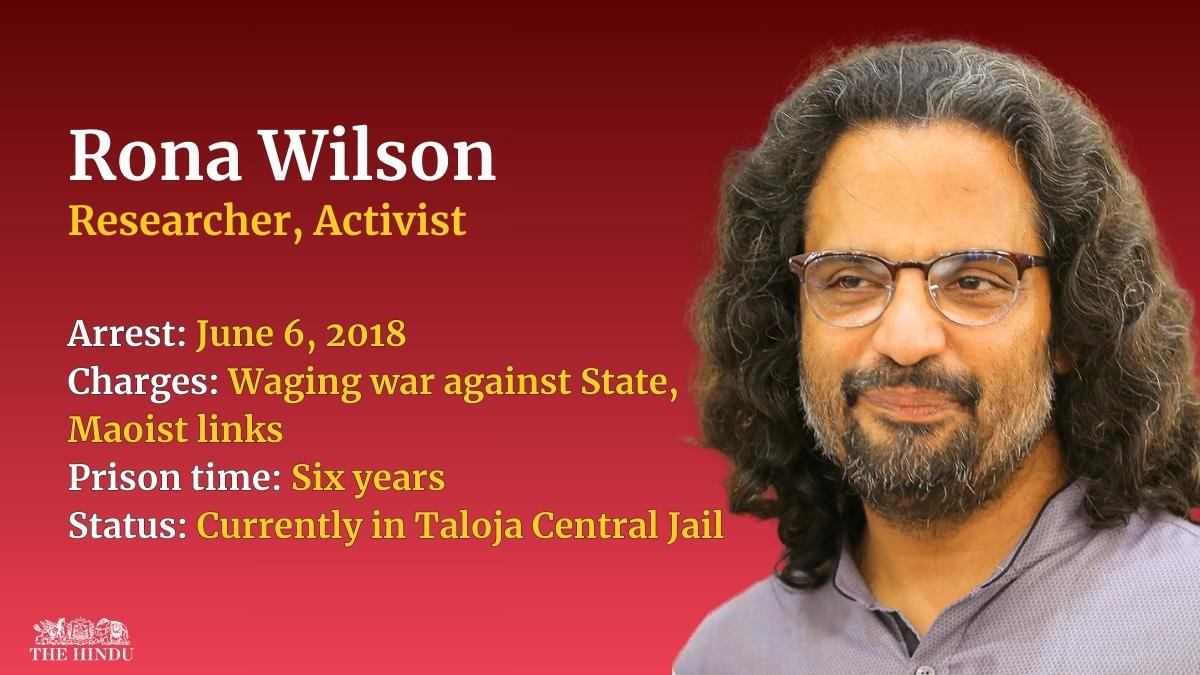
A researcher and activist, Rona Wilson has fought for the release of political prisoners and advocated against repressive laws like the UAPA. Mr. Wilson was a key member of the Committee for the Defence and Release of G.N. Saibaba—a professor who was convicted in March 2017 for having links to the Maoists.
On June 6, 2018, Rona Wilson was arrested under the UAPA for spreading Maoist ideology, promoting enmity between caste groups and “waging war against the nation.” Two days later, the Pune Police said they had found a letter on Mr. Wilson’s laptop allegedly addressed to a Maoist militant and conspiring to assassinate Prime Minister Narendra Modi. An Arsenal Consulting investigation in 2021 found Mr. Wilson’s laptop was compromised with malware, and that incriminating evidence, including 30 documents, had been planted upon it. Mr. Wilson’s phone was further targeted using the Pegasus software, according to an Amnesty International report.
Citing the Arsenal report, Mr. Wilson in February 2021 approached the Bombay HC to challenge his prosecution under the UAPA. The NIA has “stoutly” denied the Arsenal report.
In September 2021, Mr. Wilson was granted a 14-day bail to attend his father’s funeral rites. The Bombay HC in December 2021 dismissed Mr. Wilson’s default bail plea, and in May 2022, dismissed a petition seeking review of its earlier order.
For six years now, Mr. Wilson remains lodged in the Taloja Central Jail.
Surendra Gadling
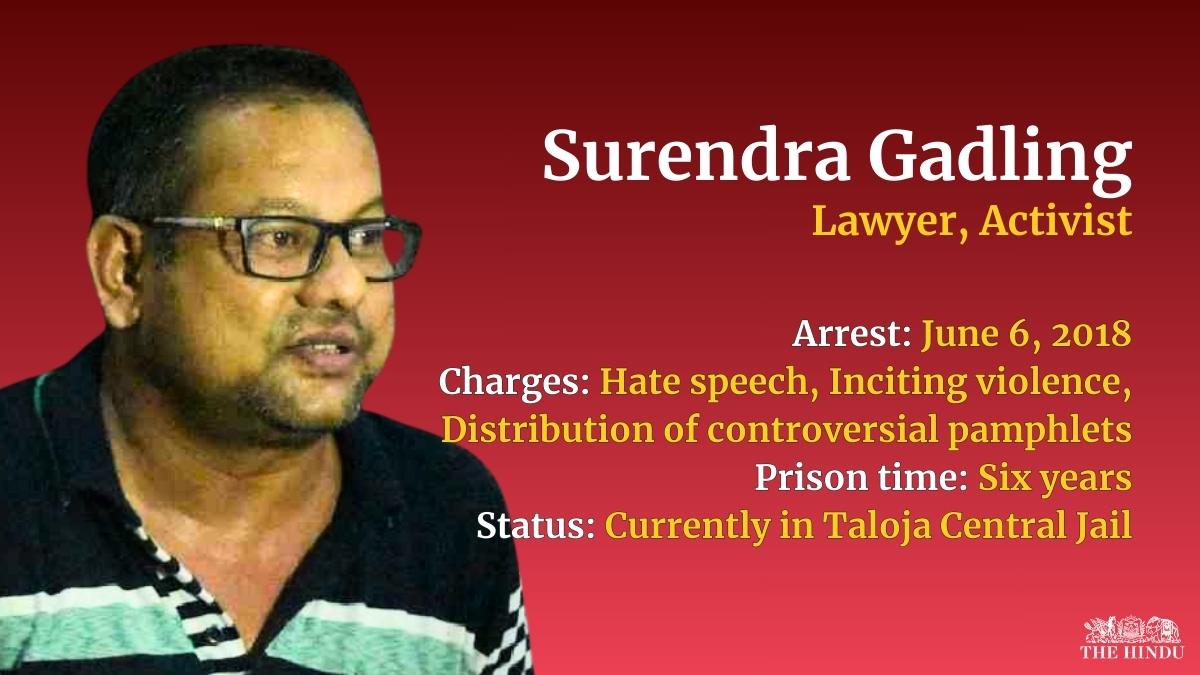
A human rights lawyer, Surendra Gadling has handled cases of police brutality and atrocities against Dalits and Adivasis.
Mr. Gadling was arrested on June 6, 2018, under the UAPA. The Pune Police accused Mr. Gadling of delivering hate speech that instigated the Bhima Koregaon violence and of distributing controversial pamphlets.
Mr. Gadling was lodged in the Yerwada jail until January 30, 2019. He was named in another case of alleged unlawful activity in the Surjagad village; Mr. Gadling spent 12 days in solitary confinement before being sent to judicial custody. A special NIA court in July 2021 rejected Mr. Gadling’s interim bail application. He, however, received a temporary bail from the Bombay HC to attend his mother’s first death anniversary.
An Arsenal Consulting report in July 2021 revealed that Mr. Gadling’s computer was also hacked and that incriminating documents were planted on it. The Bombay HC in May 2022 dismissed a petition that challenged a review of its earlier order rejecting bail to Mr. Gadling and seven other co-accused. Mr. Gadling received an interim bail in December 2023 to attend a relative’s marriage, and was required to furnish a PR bond of ₹1 lakh and two sureties of the same amount.
As of May 2024, Mr. Gadling awaits trial.
Mahesh Raut
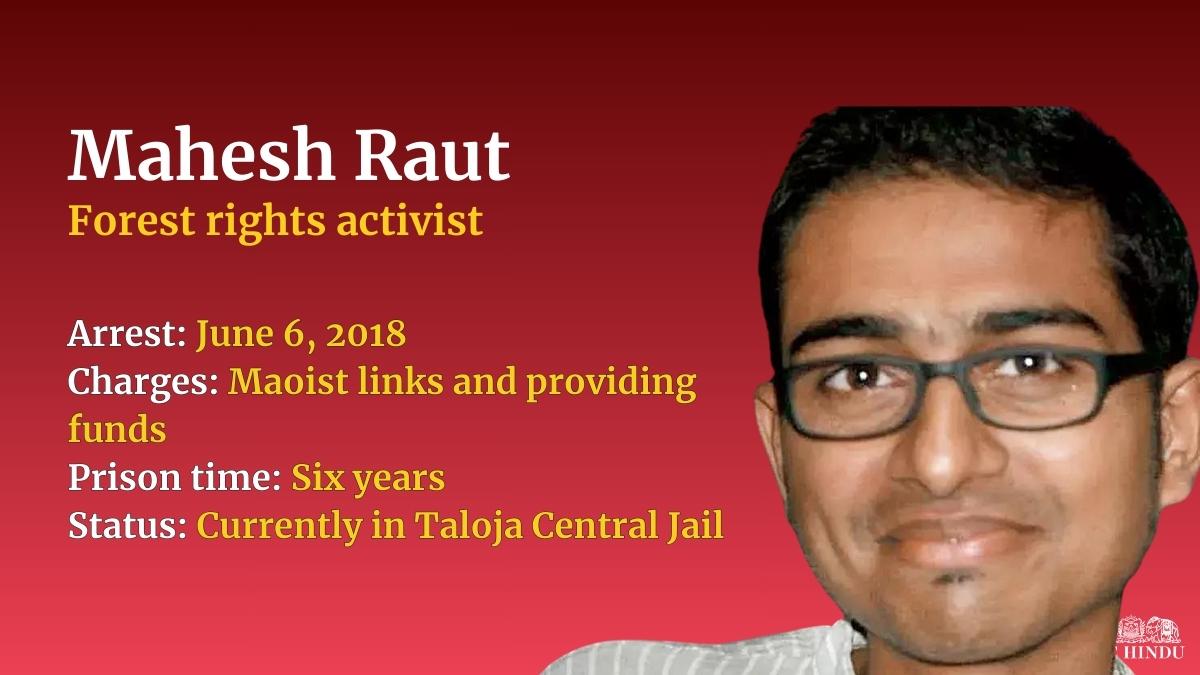
The youngest accused in the case, Mahesh Raut is a forest rights activist who worked with Adivasi communities in the mining areas of Gadhchiroli.
Mahesh Raut was arrested on June 6, 2018, for allegedly spreading Maoist ideology, recruiting Maoists and providing funds. In November 2019, the Pune Sessions court rejected a bail application by Mr. Raut and five others.
In November 2021, NIA rejected another bail plea, claiming his name was found in a letter retrieved from Mr. Wilson’s computer. Investigations have disputed the existence of this letter, finding there was malware infiltration in Mr. Wilson’s electronic mail devices and that he was subjected to digital attacks since 2012.
Mr. Raut approached an NIA special court in April 2022, challenging the claim of having handled money for CPI (Maoist), arguing that these claims too emerged from letters on Mr. Wilson’s computer, which was compromised.
The Bombay HC on September 21 last year granted him bail on the grounds of parity, as some accused in the case were on bail. The court also allowed a stay on the order for one week to allow NIA to appeal to the SC. As of May 2024, Mr. Raut remains lodged in the Taloja Central Jail and awaits trial.
Sudhir Dhawale
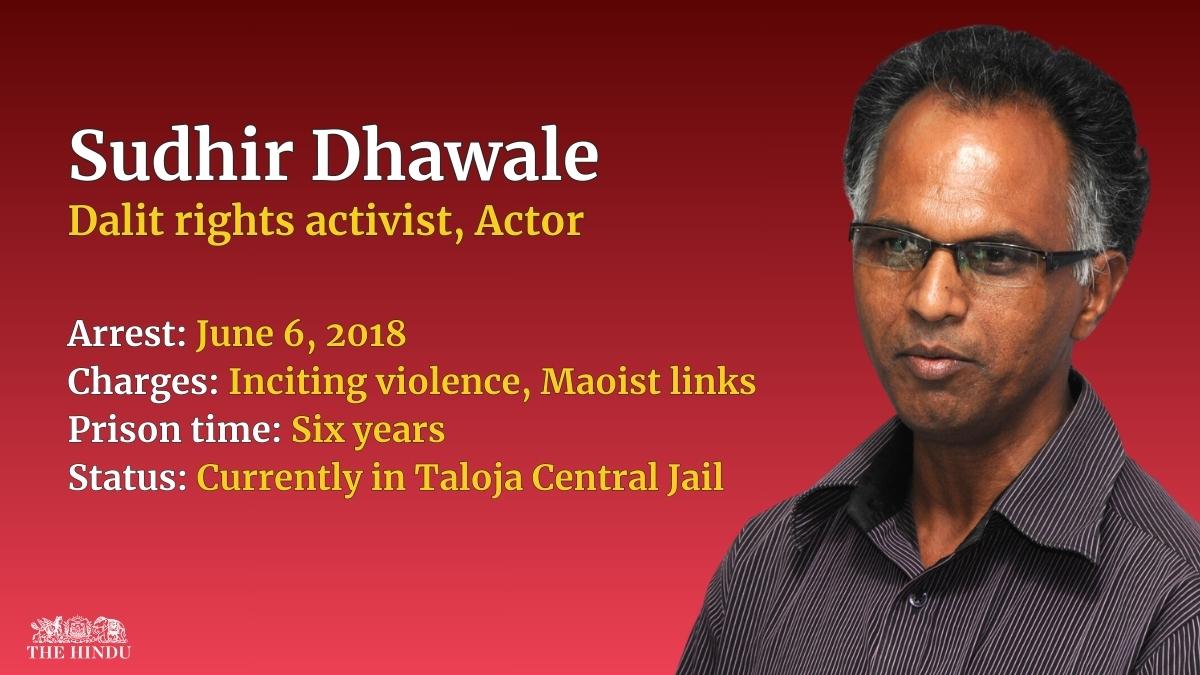
Sudhi Dhawale is a Dalit rights activist and actor. Mr. Dhawale is also the publisher of the Marathi magazine Vidrohi, which explores caste, land, labour, health and education. He was previously arrested in 2011 for “conspiring and waging war” against the Indian Government; the court released him more than three years later citing lack of substantial evidence.
Mr. Dhawale was arrested on June 6, 2018, under the UAPA. Mr. His speeches were found to be “provocative” according to Ravindra Sengaonkar, the then Additional Commissioner of Police, Pune.
On September 5, 2019, a Pune Sessions Court rejected Mr. Dhawale’s bail application. The Bombay HC in December 2021 rejected the default bail plea by Mr. Dhawale and seven others. In April 2022, Mr. Dhawale approached an NIA special court with three others, challenging the charges framed against them. Mr. Dhawali contended the charge sheet was filed eight days after the event. “The court failed to appreciate the law regarding the grant of default bail as also effect of actions of the additional sessions court at Pune which lacked jurisdiction itself,” the plea said. Mr. Dhawale also added that his speech called for protecting democracy, and was protected under the fundamental right to freedom of speech and expression.
Mr. Dhawale remains in the Tajola Central Jail.
Hany Babu
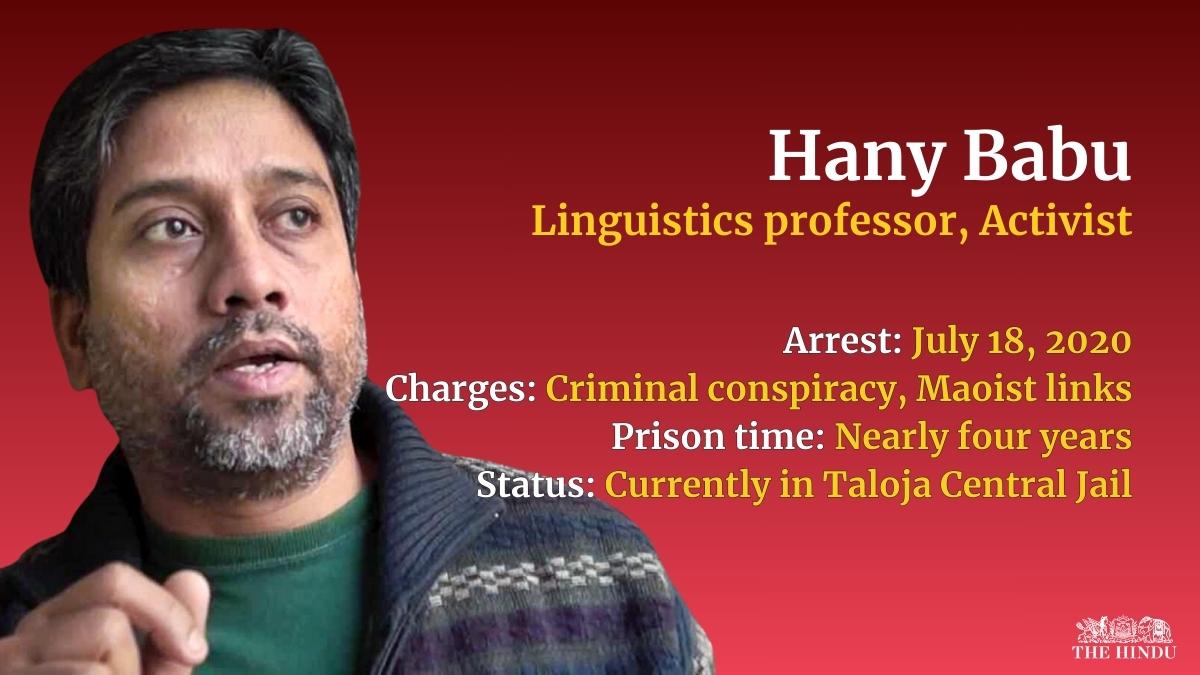
Mr. Babu is a linguistics professor at the University of Delhi, who advocates for affirmative action for marginalised communities. He is a coordinator of the Alliance of Social Justice. Belgium’s Ghent University awarded Mr. Babu an honorary doctorate for his “focus is on equal opportunities and fair access to education for the speakers of marginalised languages.”
The professor was arrested on July 18, 2020, for alleged Maoist activities. Mr. Babu was booked under the UAPA and for charges of criminal conspiracy. A special NIA court in February 2022 denied bail to Mr. Babu and three others co-accused in the case. Following this, Mr. Babu approached the Bombay HC, saying there was no evidence to suggest that he “supported activities to cause disaffection against India.”
In late 2022, Mr. Babu also sought a temporary bail on health grounds, for treatment for abdominal pain and osteoarthritis in Mumbai.
On May 3, days after Dr. Sen’s release and days before Mr. Navlakha’s bail, Mr. Babu withdrew his appeal challenging Bombay HC’s rejection of his bail application. His counsel said there has been a “change in circumstances” and they would return to the Court with a plea of parity with his co-accused who have won bail.
Mr. Babu, lodged in Taloja jail for almost four years, awaits trial.
Ramesh Gaichor
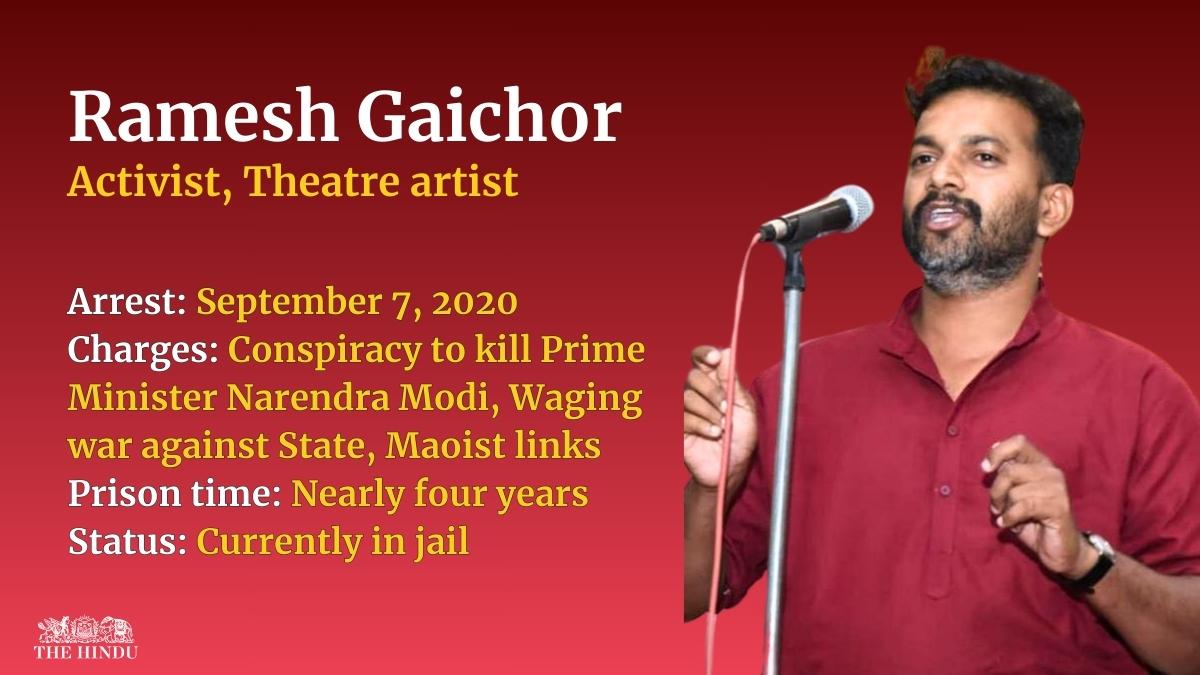
An anti-caste activist, Ramesh Gaichor is a musical performer with the troupe Kabir Kala Manch, a group that uses art and theatre to narrate stories of caste, gender and class violence. He joined the KKM in 2002 at the age of 19 in the aftermath of the Gujarat pogrom.
Mr. Gaichor was arrested on September 7, 2020, under various sections of the IPC and UAPA. Mr. Gaichor, along with Sagar Gorkhe and Jyoti Jagtap, were organisers of the Elgar Parishad event under ‘Bhima Koregaon Shaurya Din Prerana Abhiyan’ on December 31, 2017. The three were arrested for harbouring Maoist links, for planning to “end Modi Raj in a Rajiv Gandhi-type incident,” and for engaging in acts that “threaten the unity, integrity, security and sovereignty of India,” the NIA said.
In June 2021, Mr. Gaichor ran into trouble for writing a poem as a tribute to fellow activist Vira Sathidar who died of COVID-19. The Superintendent of Taloja Prison found the first two pages of the poem to be “objectionable.” Mr. Gaichor’s bail plea was denied by a special NIA court in February 2022.
Mr. Gaichor, too, awaits trial.
Sagar Gorkhe
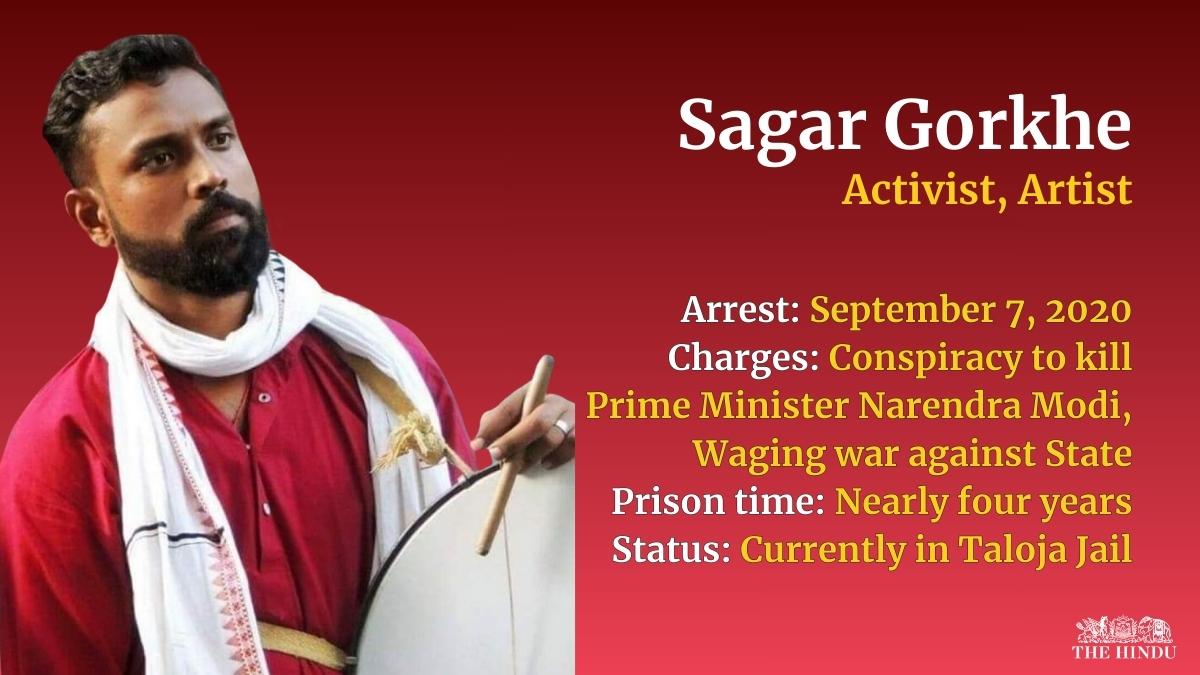
An artist, Sagar Gorkhe joined the KKM in 2004. He belongs to the Dalit Matang caste; he grew up in Pune’s slums and later studied sociology before joining KKM.
Anti-caste activist Sagar Gorkhe was arrested on September 7, 2020, under UAPA, for threatening to overthrow the government and assassinate PM Modi. Mr. Gorkhe’s bail plea, along with three others’, was rejected by a special NIA court on February 14, 2022.
Mr. Gorkhe remains lodged at the Taloja central jail. In a letter dated May 20, 2022, he described the jail as a “torture camp”.
Jyoti Jagtap
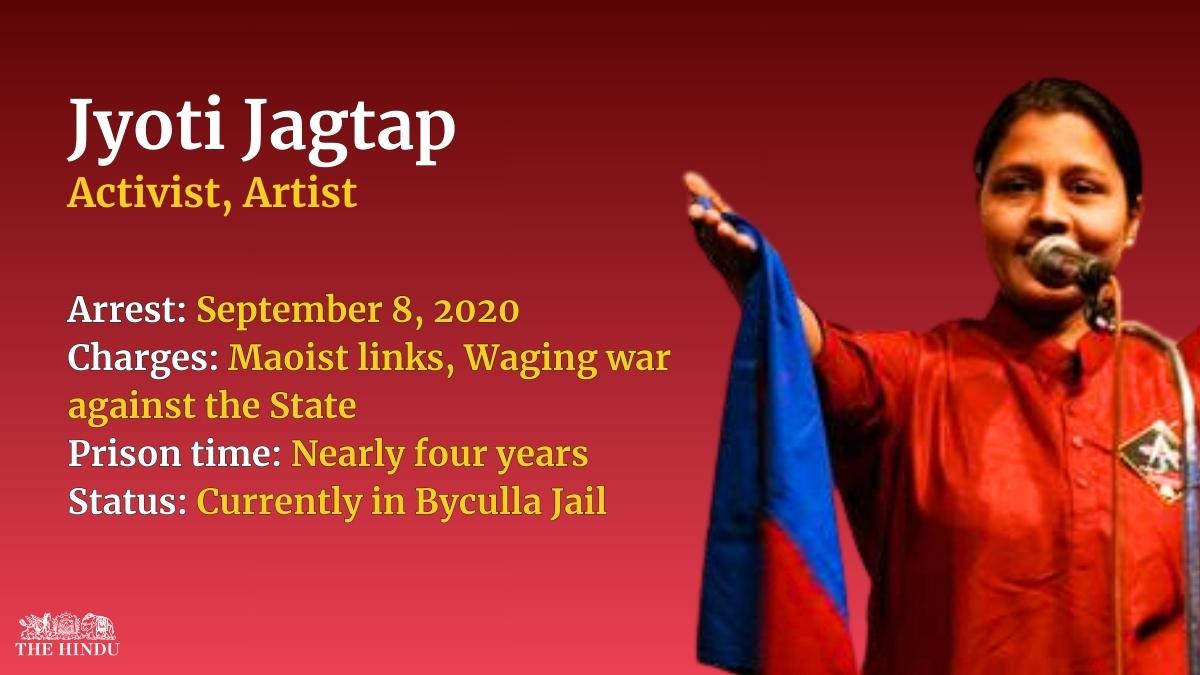
An anti-caste activist and artist, Jyoti Jagtap is a member of the collective Kabir Kala Manch. Ms. Jagtap has training in clinical psychology and had hoped to start her own counselling career, as per the India Civil Watch.
The artist was arrested on September 8, 2020, in Pune. Ms. Jagtap was accused of singing and raising provocative slogans along with other KKM members at the Bhima Koregaon rally. The NIA submitted draft charges to a Mumbai special court 11 months later, claiming that Ms. Jagtap and her co-accused had links to the banned CPI (Maoist). According to the NIA, KKM is a front for the banned terror outfit. The agency claimed Ms. Jagtap wanted to establish a “janta sarkar” via “revolution supported by a commitment to protracted armed struggle to undermine and to seize power from the state.”
Ms. Jagtap’s bail plea in October 2022 was rejected by the Bombay HC, which said that the NIA case against her was “prima facie true” and that she was part of a “larger conspiracy.” The artist approached the SC challenging this order, the hearing for which was adjourned on September 21, 2023. The bail plea was adjourned again in January this year, when a SC Bench said Ms. Jagtap’s application will be heard along with Dr. Sen’s case. Ms. Jagtap remains lodged at Mumbai’s Byculla jail.
Father Stan Swamy
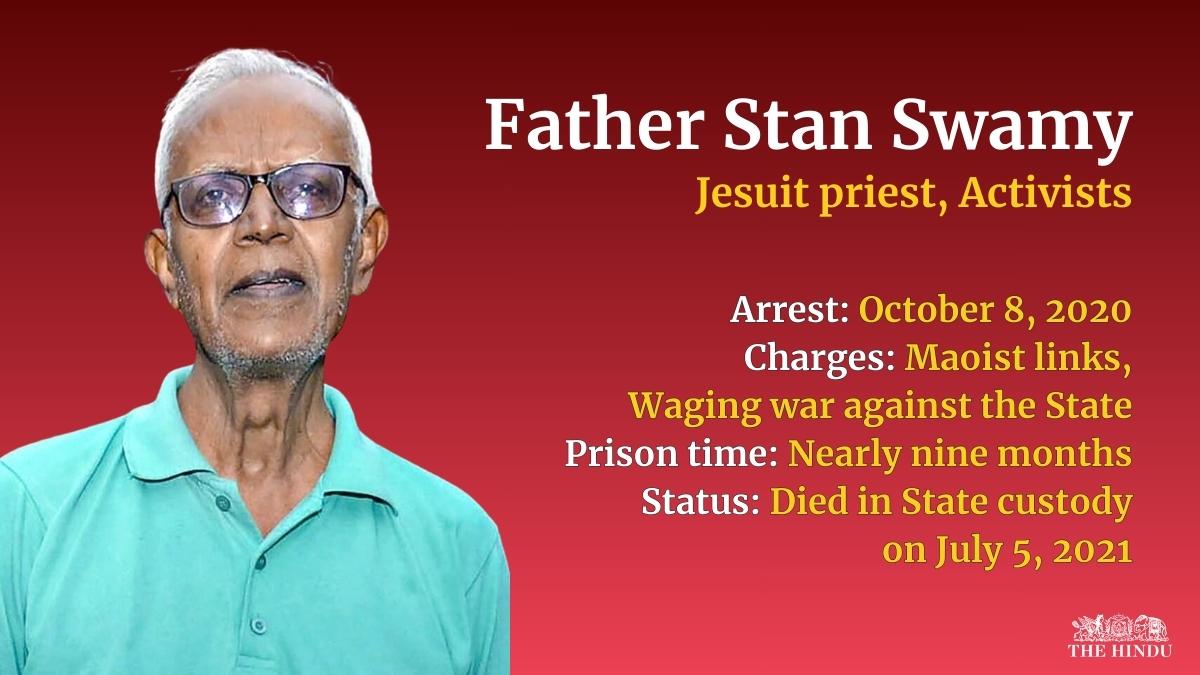
A Jesuit priest and tribal rights activists based in Jharkhand, Father Stan Swamy advocated for the rights of Dalit and Adivasi people. He was reportedly the oldest person accused of terrorism.
The NIA charged Father Stan Swamy under the UAPA, and for having ties to the banned CPI (Maoists). Reports alleged gross human rights violations, where the 84-year-old was denied basic facilities by prison and judicial staff. Father Swamy was suffering from Parkinson’s disease, had a significant loss of hearing, and was unable to walk, talk or do daily activities without support. The NIA denied his repeated requests for warm clothes, straw and sipper.
The late Father Stan Swamy was arrested in October 2020, and died on July 5, 2021, while in judicial custody. He was at an increased risk of contracting COVID-19 while in jail, the United Nations Working Group on Arbitrary Detention had warned. They added that Father Swamy’s detention was arbitrary, and his, death “utterly preventable.”
In her book The Incarcerations, Alpha Shah wrote that “the BK case is a bellwether for the collapse of democracy”, and “exposes the brutal state-sponsored abuse of democratic rights taking place across India with complete impunity.”








![Best Weight Loss Supplements [2022-23] New Reports!](https://technologytangle.com/wp-content/uploads/2022/12/p1-1170962-1670840878.png)




